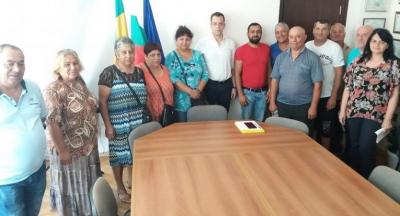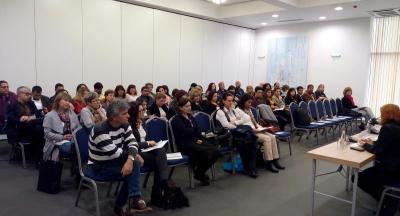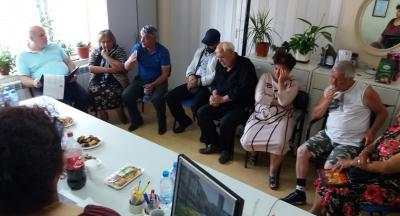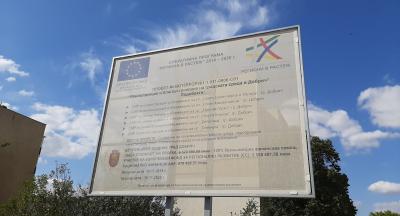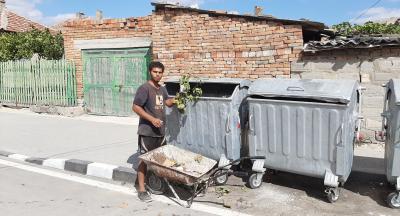Dobrich
*Disclaimer: The information and views set out in this page do not necessarily reflect the official opinion of the Council of Europe and/or the European Commission. Neither the Council of Europe, the European Commission nor any person acting on their behalf may be held responsible for the use which may be made of the information contained therein.
Dobrich city is the second largest economic and regional center in northeastern Bulgaria, in the eastern part of the Dobrudja plateau. Located between the Black Sea and the Danube River, 40 km from the border with Romania and 45 km from Varna Airport. The ethnic structure of the population is comparable to the average for the cities in Bulgaria. The Bulgarian ethnic group represents 87.5% of the total population of Dobrich, with 8.1% Turks, the Roma ethnic group numbering 3.0% of the total population. According to the local authorities, about 5.000 people are at risk of poverty: 3.000 Turks and 2.000 Roma.
Dobrich Region ranks among the top four regions with the largest Roma population. According to the data provided by the local administration, the number of people self-identified as Roma counts 2.482, but the actual number is estimated to be much higher.
In general, these neighborhoods are characterized by insufficient infrastructure, poor living conditions, low economic activity of the population and high dependence on social benefits. Over 95% of the dwellings are provided with water and electricity. However, the number of dwellings for which the water supply does not meet the legal requirements is significant. Infrastructure in the entire municipality is heavily depreciated, but in some parts of the Roma neighborhoods it is almost completely unusable.
A significant part of the Roma are health uninsured (over 50%) and they are deprived of the opportunity to benefit from medical assistance.
The ROMACT Process
Dobrich municipality joined ROMACT in March 2017 with the signature of the letter of agreement.
In December 2017, some members of the Community Action Group (CAG) joined the Municipal Council for Cooperation on Ethnic and Demographic Issues (Taskforce).
As of July 2023, ROMACT process is reinforced in Dobrich and a new agreement was signed by the Mayor.
The main problems identified by the CAG were:
- * The illegal houses built on several streets
- * The registration of multiple people on the same address
- * Issues related with obtaining identification documents
- * Issues with the sewage system on several streets
- * Issues with the water and electrical supply system
- * The waste from construction that pollutes the neighborhood and prevents the use of these places as playgrounds or sports grounds
- * The lack of street lightening
In January 2019, the Municipal Action Plan for Roma Inclusion was adopted.
The Municipality benefited of ROMACT expertise for the following project:
* Equal access to quality education for children and students from ethnic minorities- Ministry of Education (COIDUEM)
Budget : 20 000 €
Status : Approved
Trainings provided by ROMACT experts :
ROMACT experts have provided the following trainings since the start of implementing the programme:
Community Action Groups (CAG):
* Preparation and adoption of municipal budget;
* Awareness and capacity building to address drug use and delivery in the Roma neighbourhoods;
* Additionally, Both Local Authorities, the CAG and pedagogical staff received a training on social inclusion of vulnerable groups at local level;
* Addressing drug delivery and use in the Roma neighbourhoods.
Local Authorities (LA):
* Approaches to work with and in the Roma community;
* Training on “Experience and practice about addressing marginalization”;
* The international and national legal framework regulating local self-government;
* Normative documents regulating the civil registration, the issuance of Bulgarian identity documents, the municipal budget process and other relevant laws;
* The regulatory and policy framework governing the social inclusion of disadvantaged persons and groups at local level;
* Drafting project idea and partnership under transnational cooperation;
* Funding opportunities to implement the activities planned in MAPRI Dobrich;
* Making the most from the Integrated Territorial Investments and Community Led Local Development for planning and implementing the municipal plans for social inclusion;
* Social and Emotional Development and Language Culture through Lego Education;
* Round table for closing ROMACT cycle;
The following measures to solve problems in Roma community were taken :
* Overall change of the water infrastructure and the adjacent upper street infrastructure in the Roma neighborhoods - OP Environment;
* Cleaning the construction landfill and cleaning of sewerage shafts in the Roma neighbourhood, removal of dangerous dried trees;
* Regular additional cleaning of public spaces in the Roma neighborhood;
* Repair of three streets in the Roma neighborhood ( "Kupen", "Lom", "Rosa");
* Complete renovation of the main streets in the Izgrev district, new electricity poles and LED lighting in all streets of the neighborhood with OP Regions in Growth support;
* Mapping of unlawful houses in the Roma neighbourhood and planning of individual measures for adressing each case.
In the media :
The ROMACT program will be available only in Bulgaria and Romania next year. In Dobrich there are already results from the activities of ROMACT
The Municipal Council for Cooperation on Ethnic and Demographic Issues meets in Dobrich
The ROMACT program in Dobrich has real results
They solve Roma issues within a European program
ROMACT Small Grants Scheme :
ROMACT offers small grants scheme to support the efforts of the municipalities and Community Action Groups to respond together to the needs of the most vulnerable and to multiply the good practices across ROMACT municipalities.
Under the scheme of small grants, the following project was supported by ROMACT between April - July 2020:
Initiative to counter COVID19 pandemic –Municipality of Dobrich
ROMACT supported the municipality with 2337 €, reaching 197 families with dire financial status from Roma community. The project provided hygiene kits and essential food supplies for the vulnerable families most adversely impacted by the pandemic. Active members of the community took part in the implementation of the project and actively assisted with the distribution of packages to the families in need.

